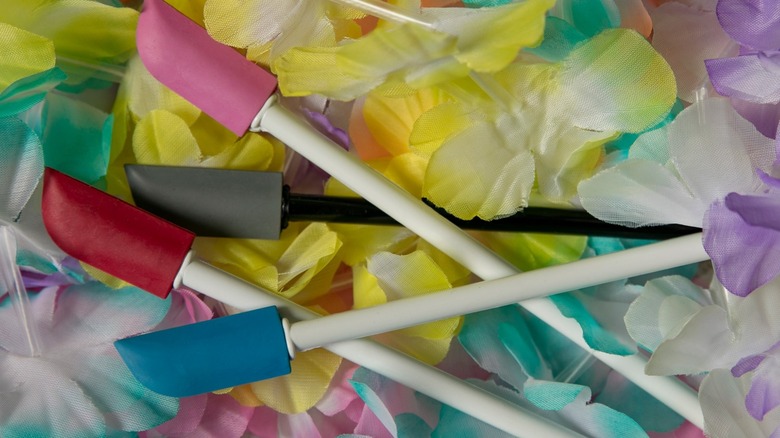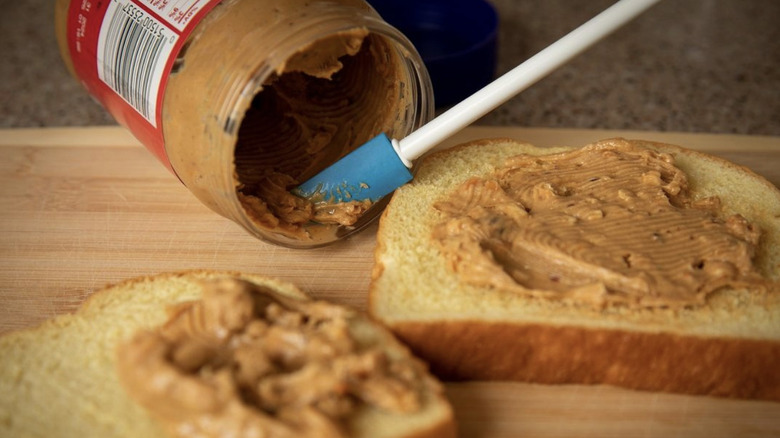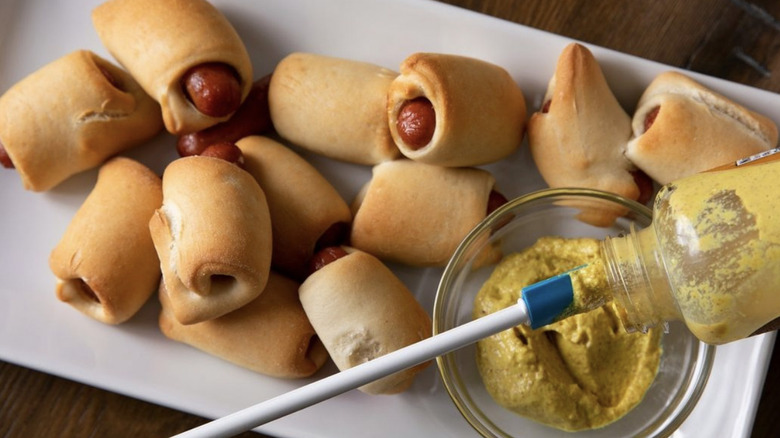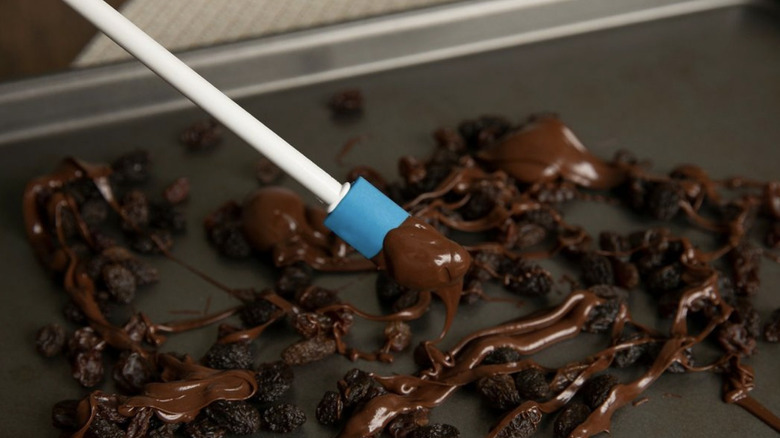What Happened To Spatty After Shark Tank?
"Shark Tank" has featured many memorable products, but entrepreneur Cheryl Rigdon wanted to solve a common everyday problem. Whether it is an expensive cosmetic or your favorite condiment, you get to the point where you can't easily pour the remaining product out of the bottle, but the opening is just too small for your finger, spoon, or spatula. You bang it on the counter or try to scrape it out with the bottom of the pump to no avail. If that product happens to be a $60 bottle of makeup, for example, you can potentially throw away $15 or more.
This is the problem that Rigdon aimed to solve with her inventions, the Spatty and Spatty Daddy. She got the idea while applying her makeup before going out on a dinner date with her husband. She brought her homemade Spatty prototypes with her to "Shark Tank" and asked for $50,000 for 40% of her brand-new company in the episode S4 E05 which originally aired Oct 12, 2012. She needed the investment so she could start manufacturing.
Her promise was the Spatty would pay for itself in less than a week of use. Investor sharks Mark Cuban, Lori Greiner, Robert Herjavec, Daymond John, and Kevin O'Leary gave the Spatty and the larger Spatty Daddy a test drive. While they appreciated the solution offered, in typical shark-style, they had questions.
What happened to Spatty on 'Shark Tank'?
When Cheryl Rigdon appeared on "Shark Tank," she had homemade prototypes of the Spatty and Spatty Daddy. She didn't have a manufacturer and had only sold about 15 handmade Spatty products on eBay. The sharks were impressed by Rigdon's solution-oriented product. The Sharks even joked that "Spatty Daddy" might become Kevin O'Leary's new nickname. In fact, O'Leary commented that Spatty was "pure gold." While he was impressed with Rigdon's invention, he felt it was too risky to invest in without a clear plan of how to get it into the hands of consumers. He was the first shark out.
Mark Cuban was the next shark out; he mentioned that Rigdon had a product but not a company. He didn't have the time to commit to the work required to take Spatty from invention to a viable brand. Robert Herjavec commented the product could be a success or a failure depending on Rigdon and how she takes it to the market. While he said he believes in her, the risk was too high. Daymond John agreed noting the sharks all loved Rigdon's invention, but it was just too early for them to invest.
Finally, Lori Greiner dropped out, but not without offering advice. She said the product was too inexpensive for QVC, but she could see it doing well as a promotional item for beauty brands. John then offered to share a couple of industry contacts with Rigdon. Some unsuccessful pitches still became successful brands – would Spatty be one?
Spatty after 'Shark Tank'
While Spatty didn't get an offer from the Sharks, Cheryl Rigdon saw it as a positive experience. On the Spatty website, she said, "It still amazes me that I was able to bring my handmade Spatty to pitch on a national show and pitch my brand new product to very successful entrepreneurs." Spatty received the "Shark Tank" bump after the episode aired, and the company experienced a huge influx of pre-orders even without a place to manufacture them, according to Gazette Review.
Also, Daymond John followed through beyond providing a couple of industry contacts. According to Rigdon, she "walked away from the experience with a lot of good advice from the Sharks and a mentorship with Daymond." This mentorship helped Rigdon speed up production and get licensing deals.
With a manufacturer, Rigdon didn't have to make each one by hand anymore and could work on moving the business forward. This positive momentum continued, leading the company to sell over half a million units by 2018. Beauty influencers were especially taken with Spatty, which is evident in the whole page of YouTube reviews on the brand's website. Spatty and Rigdon attracted media coverage from "Good Morning America," "The View," Allure, Glamour, Women's World, Seventeen, and Buzz Feed.
Is Spatty still in business?
Spatty currently offers a range of specialized mini spatulas sized for cosmetic bottles, food products like condiments, crafting and handy supplies, and bundles of multiple Spattys. They sell directly to consumers from its website and through Amazon, and other major retailers like Target. Spatty even has sold bundle packs through QVC despite the shark's predictions that it wasn't the right fit due to the low price point per unit.
The brand is also active on social media platforms like Instagram, YouTube, and TikTok sharing content including life hacks, demonstrations, and even a skit featuring Barbie and Ken where they decide to take their relationship to the next level by sharing a Spatty. The company's yearly revenue is around $1 million, which is no surprise since Spatty is one of the best kitchen tools we've seen on "Shark Tank."
The Spatty is basically a miniature spatula. Other manufacturers jumped on the trend and are also offering makeup spatulas through Amazon and other retailers. Despite the competition, Spatty still seems to be going strong.
What's next for Spatty?
One possibility is that Spatty may expand its product line, helping people save money on more types of consumable products. Cheryl Rigdon formed Rigdon Creative Solutions LLC, perhaps the name hints that she may have plans of moving beyond the mini-spatula into other problem-solving inventions. Time will only tell.
Rigdon told My Brand Journey that there are more colorful variations of the Spatty coming in the future, like seasonal-themed, metal, and even glow-in-the-dark versions. She also plans to continue expanding Spatty's presence in brick-and-mortar retail stores. She also expressed a hope that Spatty can remain a sustainable business and that she might one day be able to pass it on to her daughters if they are interested.
She also told Grit Daily that she hopes to one day be able to invest in other people's startup businesses, but isn't quite there yet. However, she said she does sometimes pay it forward by offering other young entrepreneurs advice as they pursue their own dreams.




